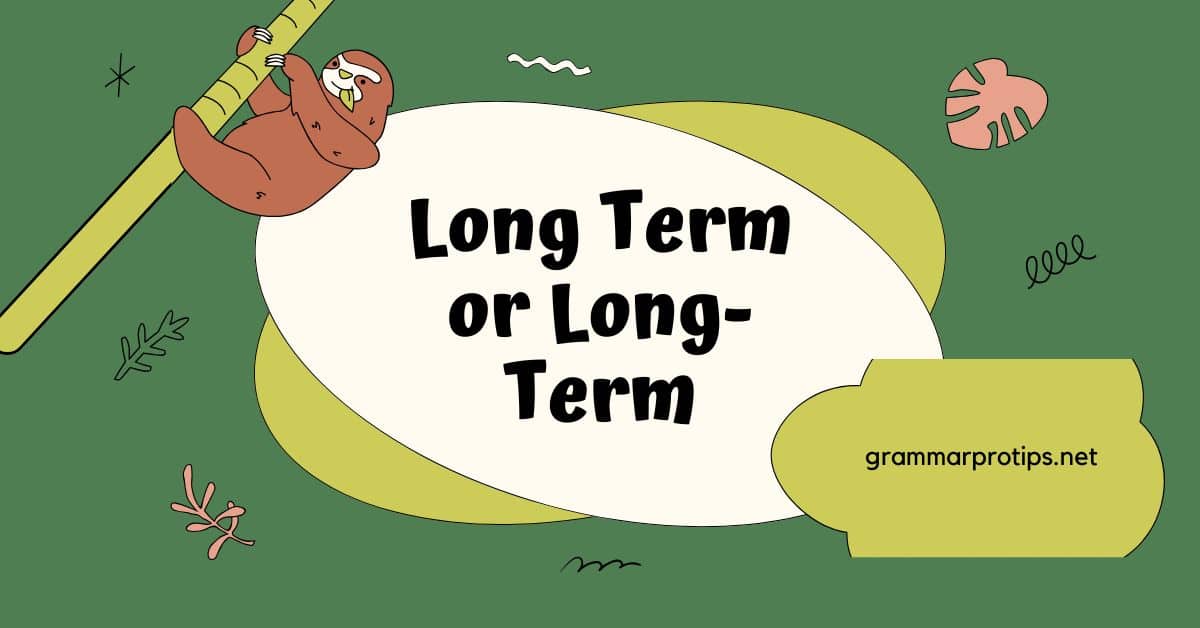When it comes to writing, the details matter. Whether you’re drafting a formal email, preparing a report, or just communicating in casual conversation, understanding the proper use of certain words is essential. One such example is the phrase “long term” but should it be hyphenated as “long-term,” or is “long term” correct? This seemingly small question can be tricky, but once you know the rules, it becomes much easier to navigate.
In this article, we will explore the difference between long term and long-term, including real-world examples, and clarify when each form is appropriate.
Understanding “Long Term” vs. “Long-Term”
Let’s start with the basics. The term “long term” refers to an extended period of time. In its most general sense, long term indicates something that spans over a considerable duration, whether it’s a plan, goal, or consequence. But here’s the kicker: long term can either be written as two separate words or hyphenated as long-term, depending on how it’s used in a sentence.
Does “Long Term” Have a Hyphen?
The real question many writers ask is: is long term hyphenated? The answer depends on how the term is functioning in your sentence. If long term is used as an adjective before a noun, it should usually be hyphenated. However, if it’s used as a noun or after the verb, it remains as two separate words. Let’s dive deeper into these two cases.
The Case for “Long-Term” (Hyphenated)
When “long-term” functions as a compound adjective (that is, it describes or modifies a noun), you’ll want to use the hyphen. For example, if you’re describing a plan, goal, or relationship that lasts for an extended period of time, you should use the hyphen to make it clear that you are talking about the long-term nature of the thing.
Example in an Email:
Subject: Follow-Up on Long-Term Investment Plans
Hi Sarah,
I wanted to check in regarding our long-term investment strategy. After reviewing the market trends, I believe we should focus more on sustainable assets for the long-term benefits.
Let me know what you think!
Best,
John
In this scenario, the phrase “long-term investment” is describing a specific type of investment that spans an extended period. The hyphen is necessary because it modifies the noun “investment.”
The Case for “Long Term” (No Hyphen)
On the flip side, when long term is used as a noun or as part of a prepositional phrase, there’s no need for a hyphen. In this case, it simply refers to an extended period of time, not directly modifying a noun.
Example in an Email:
Subject: Long Term Goals for the Upcoming Year
Hi Mark,
As we plan for the next quarter, I suggest we revisit our long term goals. Let’s aim for growth, but also keep in mind the challenges ahead over the long term. I think it’s crucial to approach it strategically.
Best,
Alice
Here, “long term” is used as a noun, referring to a period of time. No hyphen is needed.
Why Does It Matter?
You may wonder: Does long term have a hyphen in every situation? The short answer is no. The hyphen’s primary purpose is to avoid ambiguity, especially when a compound adjective precedes a noun. If you omit the hyphen, the reader might be momentarily confused about the meaning, particularly in complex writing. It’s a small distinction that can make your writing clearer and more professional.
For example:
- Long-term strategy (compound adjective describing strategy)
- Long term goals (noun phrase referring to goals over time)
The Key Rule: When to Hyphenate “Long-Term”
Here’s a quick rule to remember:
- Use long-term when it acts as a compound adjective before a noun.
- Use long term when it functions as a noun or in a prepositional phrase.
Quick Example Table
Let’s summarize the difference with a table:
| Usage | Example | Hyphen Needed? |
|---|---|---|
| As a compound adjective | She has a long-term plan. | Yes |
| As a noun phrase | The long term will bring challenges. | No |
| Describing a future plan | Their long-term goals are ambitious. | Yes |
| Referring to time period | The long term is uncertain. | No |
Common Mistakes and How to Avoid Them
A common pitfall when writing is forgetting to hyphenate the phrase long-term when it acts as an adjective. If you accidentally omit the hyphen, your writing can seem off. Here’s a quick recap:
- Incorrect: He has a long term strategy.
- Correct: He has a long-term strategy.
Similarly, it’s important to recognize that when long term is used as a noun, you should not use a hyphen. Confusing the two can confuse your reader, especially in professional or academic writing.
Examples in Different Contexts
Let’s look at how you might use long-term in different writing scenarios.
Business Email
Subject: Long-Term Partnership Proposal
Dear Mr. Anderson,
I’m reaching out to propose a long-term partnership between our companies. We believe this collaboration will be mutually beneficial and allow us to innovate over the long term. We are excited about the potential for future growth.
Best regards,
Emma Green
In this case, “long-term” describes the nature of the partnership, while “long term” refers to the duration of the partnership.
Academic Paper
In academic writing, clarity is crucial. Here’s an example of how to use long-term correctly:
“Over the long term, climate change will lead to rising sea levels, impacting coastal cities.”
In this sentence, “long term” is a noun, so there’s no need for a hyphen.
The Impact of Using the Correct Form
Whether you’re crafting emails, reports, essays, or other types of documents, proper usage of hyphens—like knowing whether to use long-term or long term can make a noticeable difference in your writing. Correct usage ensures that your audience can quickly grasp your meaning without confusion, making your communication more effective.
Example Scenario: Imagine a manager sending an email to their team about an important project. If they wrote, “We have a long term plan for success,” without the hyphen, the sentence is less clear. It could imply that the phrase “long term” is a vague reference to a future period. However, if they had written, “We have a long-term plan for success,” it’s immediately clear that the plan is designed to last for an extended period.
Wrapping It Up: Key Takeaways
So, what’s the takeaway here?
- Use long-term when the phrase functions as a compound adjective before a noun.
- Use long term when it functions as a noun or in a prepositional phrase.
- Hyphenation is your friend when you want to clarify that two words are acting together to modify a noun.
By mastering the correct usage of long term or long-term, you’ll enhance your writing and communicate more clearly, whether you’re sending a casual email or preparing a formal report. Always remember that precision is key in effective communication.

Sienna Mauldon is a passionate writer and grammar expert. On her blog, she shares easy-to-follow guides to help readers master grammar rules and improve their writing. With a love for language and teaching, Sienna makes grammar simple and fun for everyone, from beginners to experienced writers.








